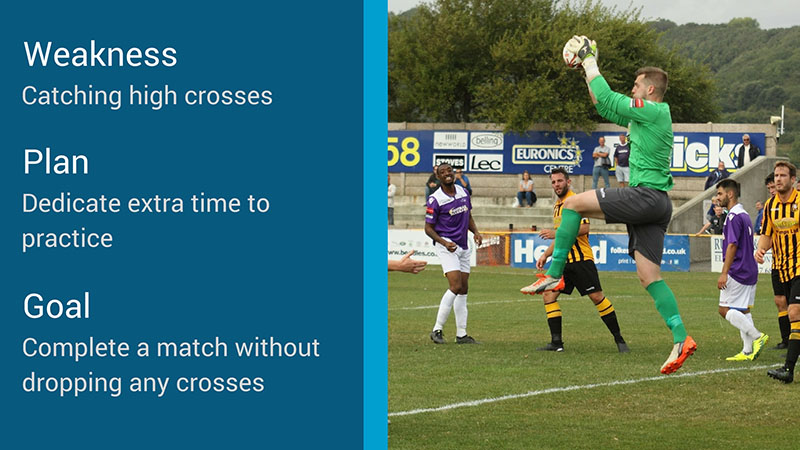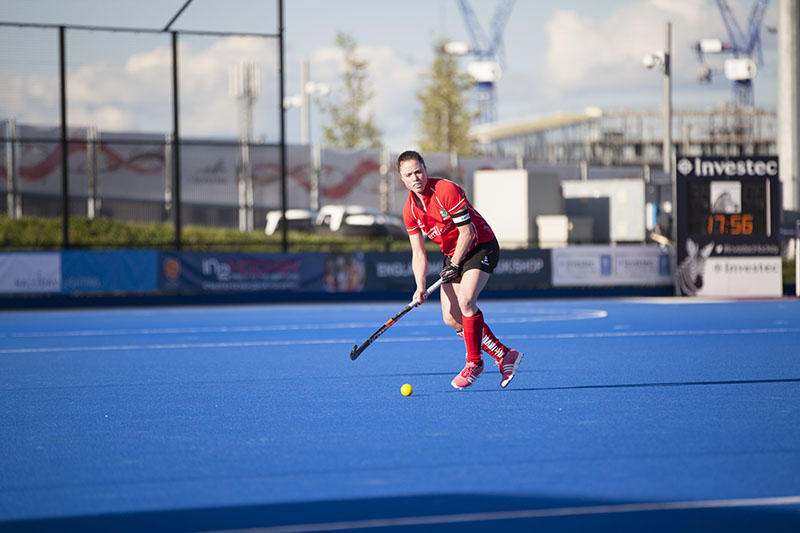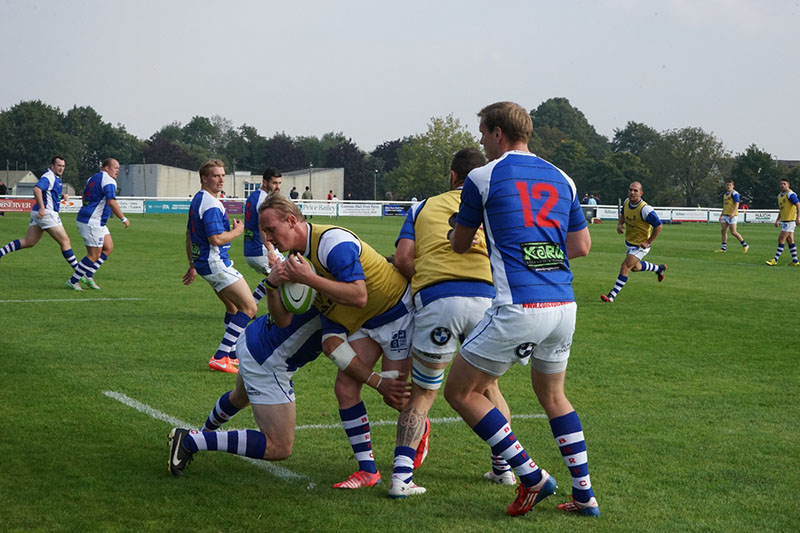As a sports player, the will to be the best is what keeps you turning out onto the pitch every single weekend. To take your place amongst the very best and stay there, you can't afford to stand still.
Raising your game and improving on past performances doesn't just come down to natural ability. There are a number of steps you can take right now, each of which can form those gradual steps to sporting greatness.
1. Have a one on one
Before you can think about moving forward as a player, you need to get a grip on where you are. Undertake a full and frank analysis of your ability as a player. For this, you're going to need the input of your coach and other important people in your sporting life.
Technical skill, understanding of your sport and mental characteristics should all be discussed in what can essentially be an audit of your game. A key participant in this process is your coach. They're likely to know your game just as well as you, will be the most qualified to suggest ways to improve and can be on hand to track your progress.
Once you've got a hold of your strengths and weaknesses, you'll be able to focus on improving the areas you need to become a better player.
2. Create a plan and set goals
The next step in your journey to becoming a better player follows directly from establishing those strengths and weaknesses. Take that list of areas where you could be better and make a season-long plan to improving upon them.

Again, your coach can play a significant role in this process. As a coach, they'll be able to draw upon on your sporting knowledge to think of drills or activities that can help you reverse a weakness in your game.
Once you have a long-term plan in place, set some goals so you can track your progress. These should be regular, achievable milestones that keep you motivated to constantly improve.
Goals are a great way of maintaining enthusiasm and determination throughout a season. Plus, failing to get to one can act as further motivation to get back on the training pitch and improve that area of weakness.
3. Condition correctly
It doesn't matter how much ability you carry into a game; if you're not physically prepared you won't be able to execute your skills for the duration of the game.
During the weeks and months of your off-season, it might seem like the easy option to switch off your sporting brain and switch-on your Netflix and beer brain. But undergoing a strength and conditioning programme (detailed here for football players and rugby players) can boost your performance on the pitch in a number of ways.
Strength underpins your performance as a player. With greater strength you can run faster, jump higher and change direction quicker.
Plus, strength and conditioning training helps to reduce your chance of injury. No player improves when they're at on the sidelines. A body in peak condition will help to keep you out on the pitch working on your weaknesses for longer.
4. Practice, practice, practice
Practice makes perfect. It's as finer sporting cliché as you'll find, but it's as true now as it's ever been. Skills, drills and techniques can take months of solid repetition before you feel comfortable taking them out on the pitch.
Building that confidence isn't easy. The best way to mastering new skills – and therefore improving as a player – is through relentless practice.
5. Train as an individual
As a player of a team sport such as football, rugby or hockey, the focus is often squared solely around the team. It can be hard as an individual to find the time to work on your specific needs, particularly in a one-on-one scenario with your coach.

Taking the time to work on your game as an individual can go a huge way to getting those improvements you've been striving for. It can help you focus on your individual needs, and gives you the time and space to master a skill that you might not be afforded on the team training pitch.
6. Build confidence
Confidence in sport is defined as having the tenacity to execute new skills out in the pressure cooker of a match scenario.
Building confidence is a major part of any coach's remit, but you can still put yourself into the best possible place to have confidence on the pitch. And again, it's all down to practice. The harder you practice your new skills, the more chance you'll have of pulling it off in a game situation.
Over-confidence in a game situation can be damaging. If you work on a skill and fail to pull it off, you may never get the required confidence to try it again. Make sure you've got it nailed down before you pull it out in a game situation.
7. Take preparation seriously
Even when your off-season strength and conditioning programme comes to an end, careful consideration needs to be taken to keep your body in peak condition to aid your improvement as a player.
Preparation for upcoming games should work in a 3-4 day cycle prior to your next game. This includes eating and drinking the right foods in 4-5 small meals per day and engaging in activity that isn't quite as strenuous as high-intensity pre-season training.

Even on match day, you can make up that extra 2-3% by preparing your body as thoroughly as possibly by eating the right meal and undertaking a light physical exercise on the morning of the match.
A healthy body gives you a greater chance of optimal performance on the pitch, whilst again reducing the chance of injury to keep you out there for longer.
8. Understand the game better
Thanks to the progression of elite levels of sport, you can really go deep into the tactical and strategic levels of your chosen pass time. Video analysis of the pros, coaching advice and even philosophical musings of how to be a success in sport are all widely available to those who seek to enhance their understanding.
On the pitch, it pays to know the finer workings of your sport. It will enhance the understanding of your role on the pitch and how it contributes to the success of those around you.
Without a knowledge of sport, you can't fully appreciate how you as an individual can grow within it.
9. Get some expert advice
To further enhance your understanding of the how the very best succeed in sport, watch them. Consuming sporting content on your TV or online is easy, and can help you learn how the very best do it.
When doing this, don't limit yourself to the sport you participant in. In all sports, there are winners that dedicate their lives to being the best. Many of them adopt the same attitude and determination to achieving sporting greatness – and you could do a lot worse than taking a leaf out of their book.
You don't even have to go too far to get into the minds of the very best. We have a superb video coaching resource, the Pitchero Coach Academy that draws on some of the greatest minds in football, rugby and cricket.

